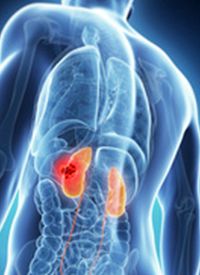Article
Nivolumab Plus Salvage Immunotherapy Leads to High TFS Rates in Advanced RCC
Author(s):
Nivolumab monotherapy, plus salvage nivolumab plus ipilimumab for progressive disease, resulted in high treatment-free survival rates in patients with previously untreated advanced clear cell renal cell carcinoma.

Nivolumab (Opdivo) monotherapy, plus salvage nivolumab plus ipilimumab (Yervoy) for progressive disease, resulted in high treatment-free survival (TFS) rates in patients with previously untreated advanced clear cell renal cell carcinoma, according to findings from cohort A of the phase 2 HCRN GU16-260 trial (NCT03117309) presented at the 2023 Genitourinary Cancers Symposium.
In the overall population (N = 138), the overall survival (OS) was 29.9 months, survival after additional treatment was 8.9 months, TFS was 9.4 months, and survival after protocol treatment was 11.5 months.
In the favorable risk group (n = 38), the mean OS was 35.7 months, 65.6% of patients alive and treatment-free at 36 months, and the mean TFS was 12.9 months.
For those in the intermediate to poor risk group (n = 90), the mean OS was 27.4 months, 27.1% of patients were alive and subsequent treatment-free at 36 months, and the TFS was 8.0 months.
Based on the International Metastatic Database Consortium, the objective response rates were 57.9% (95% CI, 40.8%-73.7%) in the favorable risk group, 25.6% (95% CI, 17.9%-37.0%) in the intermediate risk group, and 33.3% (95% CI, 17.9%-37.0%) in the poor risk group. Stable disease was observed in 39.5%, 34.6%, and 33.3%, while progressive disease was observed in 2.6%, 39.7%, and 33.3% of patients in the favorable-, intermediate-, and poor-risk groups, respectively.
Three-year end points included progression-free survival in 31.2% of patients in the favorable risk group and 7.2% collectively in the intermediate and poor risk groups. OS was observed in 96.8% and 56.6% of the favorable and intermediate/poor risk groups, respectively. The proportion of patients alive and free from subsequent treatment was 65.6% in the favorable risk group and 27.1% in the intermediate/poor risk group.
At 36 months, the overall group had a mean TFS of 9.4 months (95% CI, 7.6-11.3), 12.9 months (95% CI, 9.7-16.1) in the favorable risk group and 8.0 months (95% CI, 5.8-10.2) in the intermediate/poor risk group. Within each of the 3 respective groups, those that had grade 3 or higher treatment-related adverse effects occurred at 1.2 months, 1.5 months, and 1.0 months, respectively.
In those given nivolumab plus ipilimumab, the 36-month survival means were 9.8 months and 5.8 months in the favorable and intermediate/poor risk groups, respectively.
In part A, patients were given nivolumab at 240 mg every 2 weeks for 6 cycles, 360 mg every 3 weeks for 4 cycles, or 480 mg every 4 weeks. They were then divided by response type; those with partial and complete responses continued on nivolumab for up to 96 weeks, and those with progressive disease or best response with stable disease at 48 weeks continued to part B of the study. In part B, patients were given nivolumab at 3 mg/kg plus ipilimumab at 1 mg/kg every 3 weeks for 4 cycles followed by nivolumab maintenance for up to 48 weeks. Patients then entered treatment-free survival and then were given subsequent therapy.
Baseline characteristics evaluated in 128 patients included a median age of 65 years, an ECOG performance status of 0 (63%), and 72% of patients were male. Additionally, sarcomatoid features were present in 17% of patients, and prior nephrectomy was given in 82%.
Reference
Atkins MB, Jegede OA, Haas NB, et al. Treatment-free survival (TFS) outcomes from the phase II study of nivolumab and salvage nivolumab + ipilimumab in advanced clear cell renal cell carcinoma (aRCC) (HCRN GU16-260-Cohort A). J Clin Oncol. 2023;41(suppl 6):604. doi:10.1200/JCO.2023.41.6_suppl.604








